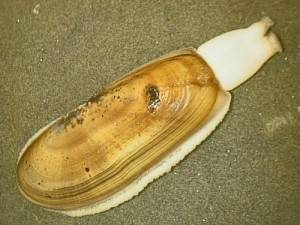THE FIRST RAZOR clam digs of the fall season will get underway tonight and continue through Saturday night at three ocean beaches.
Diggers can pick and keep the first 15 razor clams they dig up during evening tides at Twin Harbors, Copalis and Mocrocks after marine toxin tests showed that clams on those beaches are safe to eat. No digging will be allowed on any beach before noon.
The upcoming dig is approved on the following beaches, dates, and evening low tides:
• Today: 8:58 p.m.; -0.6 feet; Twin Harbors, Mocrocks
• Friday: 9:41 p.m.; -0.3 feet; Twin Harbors, Copalis
• Saturday: 10:26 p.m.; +0.1 feet; Twin Harbors, Mocrocks
Diggers want to be sure to come prepared with good lighting devices and always keep an eye on the surf, particularly in the fall when the best low tides come after dark, according to Dan Ayres, coastal shellfish manager for the state Fish and Wildlife Department.
“Digging after dark brings with it the spectacle of thousands of small lights representing individual razor clam diggers working their way up and down the beach,” Ayres said.
Another razor clam dig has been tentatively scheduled for Oct. 25-28, pending results of future toxin tests.
More information on planned digs can be found on WDFW’s razor clam webpage at tinyurl.com/PDN-RazorInfo.
All diggers age 15 or older must have an applicable 2018-19 fishing license to harvest razor clams on any beach. Licenses, ranging from a three-day razor clam license to an annual combination fishing license, are available at fishhunt.dfw.wa.gov and from license vendors around the state.
Elk bow hunt rule corrected
Bow hunters are not allowed to harvest antlerless elk in any area of the Olympic Peninsula during any general season. An error that appeared in an online summary on Fish and Wildlife’s website incorrectly indicated that some areas would be open to the harvest of antlerless elk.
The summary should have stated that game management units (GMUs) 603, 612, 615, 638 (except for Elk Area 6064), and 648 would be open for bull elk with three or more antler points on one side. “Antlerless only” should not have been listed.
The areas in question in Clallam, Grays Harbor and Jefferson counties are scheduled to open for a late season archery hunting for elk Nov. 21 through Dec. 15.
The correct legal description of the season approved by the state Fish and Wildlife Commission is contained in the 2018 Big Game Hunting pamphlet, said Brian Calkins, regional wildlife manager for Fish and Wildlife.
“The three point or better, bull-only rule protects cow elk from harvest and helps maintain a healthy male/female ratio in the population,” Calkins said. “In combination, these two factors are important to maintaining elk population numbers. We apologize for the error, and want to emphasize that the regulations in these areas have not changed from previous years.”
Fish-blocking culverts
A meeting to “learn about efforts to inventory and prioritize fish-blocking culverts on streams flowing into the Western Strait” will be held tonight in Sekiu.
The North Olympic Peninsula Lead Entity for Salmon is the sponsor of the meeting.
It will be held at the Sekiu Community Center, 42 Rice St., at 6 p.m. tonight.
Lead Entities are locally-based, science-driven, community watershed consortiums. Each lead entity is responsible for spearheading salmon restoration and coordinating the process of identifying and prioritizing state salmon recovery projects within their geography.
Join group
Fish and Wildlife is seeking members of the sport fishing community to serve on a committee that oversees the Puget Sound Recreational Fisheries Enhancement program.
People interested in serving on the 10-member Puget Sound Recreational Fisheries Enhancement Oversight Committee have through Friday, Nov. 16 to apply.
Key responsibilities of the program are to restore and enhance recreational fisheries in Puget Sound, ensure the productivity of sustainable populations of salmon and marine bottomfish, and promote recreational fishing opportunities.
Ten volunteers will be appointed to the oversight committee. Members serve two-year terms and may be re-appointed. The next term begins in January 2019 and expires in December 2020.
The committee, which is a broad representation of the sport fishing community, meets several times a year to review projects and provide guidance on funding activities related to the enhancement program.
To qualify, applicants should be closely linked and maintain strong communication with the recreational fishing community, have an understanding of salmon and bottomfish fisheries in Puget Sound and be able to attend the meetings.
Committee members do not receive direct compensation for their work.
Interested individuals do not have to be affiliated with an organized group. Individuals must submit a letter of interest and a resume with the following information:
Name, address, telephone number and email address.
Relevant experience and reasons for wanting to serve as a member of the enhancement group.
Effectiveness in communication, including outreach and promotion.
Interested individuals should submit their application electronically to David Stormer at david.stormer@dfw.wa.gov or mail to Washington Department of Fish and Wildlife, Attn: David Stormer, 600 Capitol Way North, Olympia WA, 98501-1091.
For more information on the enhancement program and oversight committee, please visit wdfw.wa.gov/about/advisory/psrfef/ or contact David Stormer at 360-902-0058.

